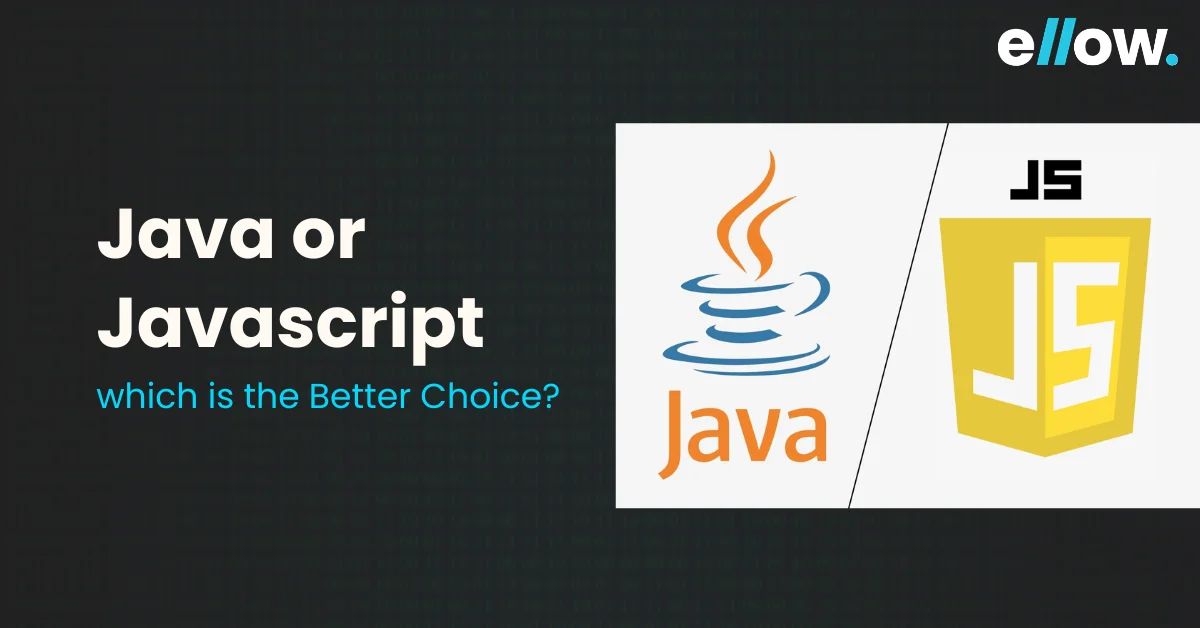Let’s build the future together.
Great ideas need great people. Partner with us to bring your vision to life, or take the first step in your career by joining our team of innovators.

The ongoing debate between Java and JavaScript often causes confusion among developers and businesses. Despite their similar names, Java and JavaScript serve distinct roles in the programming world, each with unique strengths and applications.
Java is a robust and versatile language, renowned for building complex, large-scale applications. Its stability and performance make it a preferred choice for enterprise-level software and backend systems.
In contrast, JavaScript is a dynamic scripting language essential for creating interactive and engaging web content. It powers the modern web, enhancing user experiences with responsive designs and real-time updates.
According to a survey by Statista, JavaScript is the most widely used programming language globally, with over 65% of developers adopting it. While Java is less prevalent, it remains a popular choice due to its reliability and extensive use in various industries.
Understanding the differences between Java and JavaScript is crucial for making informed decisions about your projects. This article will delve into the unique characteristics of both languages, comparing their strengths and weaknesses to help you determine which is better suited to your specific needs.
Java is a versatile, object-oriented programming language that allows developers to create applications that can run on multiple platforms. It was developed by James Gosling at Sun Microsystems in 1995 and is now owned by Oracle.
| Pros of Java | Cons of Java |
| ???? Reusability: Encourages reusable code and modular programs. | ???? Memory Consumption: Java applications tend to consume more memory. |
| ???? Portability: Programs can easily be moved across different platforms. | ???? Performance Overhead: Sometimes slower than natively compiled languages due to the JVM. |
| ???? Multitasking: Capable of performing multiple tasks simultaneously. | ???? Verbose Syntax: Requires more lines of code compared to some other languages. |
| ????️ Error Detection: Identifies and resolves errors during compilation. | ???? Complex Updates: Managing updates and backward compatibility can be challenging. |
| ????️ Exception Handling: Simplifies error management and debugging. | |
| ???? Network-Centric: Well-suited for distributed computing environments. | |
| ???? Rich Ecosystem: Offers extensive libraries, APIs, and tools to enhance development efficiency. | |
| ????️ Cross-Platform Compatibility: Applications run on any device with JVM. |
JavaScript (JS) is a versatile scripting language used to create dynamic and interactive web pages. It operates on the client side and integrates seamlessly with other technologies like REST APIs, XML, and Node.js.
| Pros of JavaScript | Cons of JavaScript |
|---|---|
| ???? Interactive Elements: Adds animations and interactive features to websites. | ???? Security Issues: Vulnerable to security exploits if not properly managed. |
| ⚡ Efficient: Reduces server load by processing tasks on the client side. | ???? Browser Variability: Can behave differently across various browsers. |
| ???? Data Storage: Can store and retrieve data on users’ devices. | ???? Performance: May slow down if handling complex computations. |
| ????️ Compatibility: Works with HTML and CSS for rich web interfaces. | ???? Debugging Difficulty: Can be challenging to debug large codebases. |
| ???? Browser Support: Compatible with major browsers like Chrome, Firefox, and Edge. | ???? Single Threaded: Limited by its single-threaded nature, which can affect performance. |
| ???? Modular: Supports modules, classes, and interfaces. | |
| ⚡ Immediate Feedback: Provides instant responses to user actions. | |
| ???? Versatile: Runs on both client and server sides. |
Both Java and JavaScript support object-oriented programming. This means they use objects and their relationships to structure code. Key OOP concepts like classes, inheritance, encapsulation, and polymorphism are present in both languages.
JavaScript runs directly in modern web browsers, enabling dynamic and interactive websites. It handles tasks like form validations and animations. Java used to run in browsers through Applets, but this is no longer supported in modern browsers.
Java is widely used for server-side applications, supporting the back-end of websites. Servers like Apache Tomcat and JBoss are Java-based. JavaScript, with Node.js, is also used for server-side development, allowing it to run on the server as well.
Both Java and JavaScript have extensive libraries and frameworks. These tools provide reusable code, helping developers save time and effort. Popular Java frameworks include Spring and Hibernate, while JavaScript boasts frameworks like React and Angular.
| Aspect | Java | JavaScript |
|---|---|---|
| ???? Type | Object-Oriented Programming Language | Scripting Language |
| ???? Usage | Backend development, mobile apps, enterprise apps | Frontend development, web interactivity, server-side scripting (Node.js) |
| ????️ Syntax | Statically typed, requires explicit declarations | Dynamically typed, more flexible with implicit declarations |
| ???? Execution | Compiled into bytecode, runs on JVM | Interpreted directly by web browsers |
| ⚙️ Concurrency | Multi-threaded support | Single-threaded with event-driven architecture |
| ???? Portability | Write once, run anywhere on JVM | Runs on any web browser, cross-platform |
| ????️ Development | Requires JDK and an IDE | Requires a text editor and a browser |
| ???? Ecosystem | Extensive libraries and frameworks like Spring, Hibernate | Rich libraries and frameworks like React, Angular, Vue |
| ???? Updates | Regular updates with significant language changes | Frequent updates with new features and APIs |
| ???? Performance | Generally faster due to compiled nature | Slower for complex computations, but fast for web interactions |
| ???? Security | Strong security features built into JVM | Prone to security issues if not properly managed |
| ???? Learning Curve | Steeper learning curve due to complexity | Easier to learn, especially for beginners |
Choosing between Java and JavaScript depends on the specific needs of your project:
Java: Ideal for large-scale enterprise applications and Android apps. It offers strong performance and reliability, making it a great choice for complex projects. However, it has a steeper learning curve.
JavaScript: Perfect for web development, adding interactivity to websites. It’s easier to learn and use, with support from all modern web browsers. While it excels in web interactivity, it may be less efficient for large-scale applications.
There is no clear winner; the best choice depends on your project’s requirements. Use Java for complex, large-scale applications and JavaScript for enhancing web interactivity.
This comparison of Java and JavaScript provides clear insights into their differences and current relevance. It highlights their unique characteristics and distinct purposes.
Both languages have strengths that make them ideal for specific development needs. Java is robust, speedy, and enhances production environments, while JavaScript is lightweight, easy to use, and boosts compatibility.
Understanding these aspects will help you decide which language fits your web development needs best.
If you still have doubts or need guidance in choosing the right programming language for your project, ellow can help you make the best decision.
Whether you seek expertise in web development, mobile app creation, or backend systems, ellow.io provides tailored solutions to match your project needs.
By leveraging their services, you can streamline your hiring process and ensure alignment with your development goals, empowering your business to thrive in today’s competitive landscape.
Java is a statically typed language primarily used for backend development, while JavaScript is a dynamically typed language used mainly for frontend web development. Java runs on the Java Virtual Machine (JVM), whereas JavaScript runs in web browsers.
JavaScript is typically better suited for frontend web development due to its integration with HTML and CSS, enabling dynamic and interactive web pages. Java, on the other hand, is preferred for server-side applications and enterprise-level backend systems.
Java tends to perform better in terms of raw processing speed and efficiency, especially for applications requiring heavy computation or large-scale data processing. JavaScript, while fast in modern browsers, may face limitations compared to Java in certain computational tasks.
Both Java and JavaScript offer excellent career prospects. Java is widely used in enterprise environments, leading to a high demand for Java developers. JavaScript’s dominance in web development ensures strong demand for frontend developers, and its versatility with frameworks like Node.js expands opportunities in backend development as well.
Java and JavaScript often work together in full-stack development scenarios. Java powers the backend logic and data handling, while JavaScript handles frontend interactivity and user interface dynamics. This combination allows developers to create robust, scalable applications that leverage the strengths of both languages.

GCC vs Outsourcing vs Remote Teams: What Works in 2026

Vibe Coding vs AI Assisted Coding: The Difference That Will Define the Next Generation…

From Code Generation to Bug Detection: 10 AI Tools Every Developer Should Know in…
Please feel free to share your thoughts and we can discuss it over a cup of tea.
Get a quote
GCC vs Outsourcing vs Remote Teams: What Works in 2026

Six Things to Consider When Hiring Remote Talent

ellow.io enters remote hires market with AI-based screening process